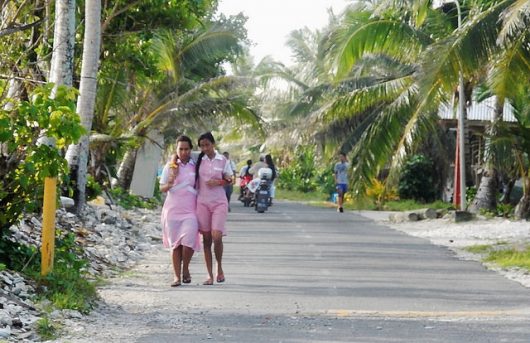Girls’ Education in Tuvalu

On the remote Pacific Island country of Tuvalu, the expectations for men and women are distinct. Women are expected to adopt a subordinate role, are usually less involved in politics and are not provided the same legal protections as men especially in regards to child custody or inheritance. If they work in the formal economy, they are generally expected to be teachers and nurses. Yet, Tuvalu has one of the highest gender development ratios in the Pacific Island region. At least in part, this favorable ranking is the result of the state of girls’ education in Tuvalu.
Education in Tuvalu
According to the Education for All 2000 Assessment, Tuvalu has had a longstanding commitment to universal access to basic education. The government has explicitly cited that a child cannot be denied an education based on their sex. However, proximity to the school and academic achievement continue to be the biggest barriers in secondary education.
Though pre-primary and primary schools are numerous, secondary schools are much more difficult to access. There are 18 Early Childhood Care and Education (ECCE) centers and 10 primary schools. Each of the 9 main islands has its own government primary school and there is an additional faith-based private school located in the capital, Funafuti.
In contrast, there are only two secondary schools. Therefore, in order to attend secondary school, the student must relocate to the island on which the school resides. There is a public boarding school located on the island of Vaitupu, and a faith-based private school located in Funafuti.
These schools do not discriminate between sex, but the student’s admittance into these schools is dependent upon the student’s performance on the National Year Eight Examination (NYEE). If the student is successful, then the student proceeds to an additional four years of schooling, two of which would be compulsory. If the student is not successful, then they have several options: (1) repeat year eight, (2) enroll in vocational training or (3) illegally drop-out of school.
Girls’ Education in Tuvalu
While girls’ education in Tuvalu is provided throughout pre-primary, primary and secondary schools, girls are not allowed access to vocational training. Vocational training in Tuvalu consists of The Tuvalu Maritime Training Institute (TMTI) as well as Technical and Vocational Education and Training (TVET) courses. These programs provide training for vocations that are reserved for men in Tuvaluan society such as farming, fishing, carpentry and welding.
Perhaps because women are unable to pursue the vocational training alternatives, girls are actually more likely to progress to secondary school than their male counterparts. Prior to secondary school, in pre-primary and primary schooling, females account for a little under half of the student population.
This is reflective of the nations demographic of which females make up a little under half of the nation’s population. However, according to the 2015 National Educational Review report, females consistently make up nearly two-thirds of the student population enrolled in secondary school.
Girls generally outperform their male counterparts throughout their educational careers. In 2013, 64.2 percent of girls who sat for the NYEE passed the exam. Only 58.6 percent of boys passed the exam that same year. As a result, 12 boys dropped out of school that year. Only one female dropped out.
Of the roughly 35 percent of females that did not pass the exam that year, 33 percent re-enrolled in year eight. Of the 41 percent of males that failed, only 29 percent re-enrolled. This is likely due to the fact that boys have vocational alternatives that do not require passage of the NYEE.
Following secondary school, both genders have access to tertiary education. Both The University of South Pacific and Fiji National University have campuses in Tuvalu, and more programs can be explored in Australia and New Zealand.
A Positive Future For Women in Tuvalu
Tuvalu’s current strategy to address gender inequality in the country is outlined in a document called Te Kakeega III. The country intends to amend gender-biased laws by the year 2020. Furthermore, the country is actively promoting women’s political involvement. As a result, more women now hold positions in the health and education sectors as well as some top positions in several non-government organizations.
And they are not alone, other groups, like Pacific Women, are working to change the way that women are seen in society to bring about gender equality. Their three-year plan will invest 1.8 million while working with the Department of Gender Affairs to give a voice to the women of Tuvalu.
Girls’ education in Tuvalu already provides the foundation for combatting pre-existing inequality. The next step is addressing Tuvaluan societal expectations. With the help of groups like these and government support, Tuvalu has a great chance of being a positive example not only for girls’ education in Tuvalu but also for a gender-equal society.
– Joanna Dooley
Photo: Flickr
